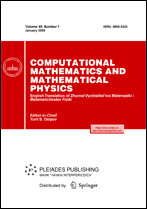|
This article is cited in 1 scientific paper (total in 1 paper)
Problems on a semiaxis for an integro-differential equation with quadratic nonlinearity
V. L. Vaskevichab
a Sobolev Institute of Mathematics, Siberian Branch, Russian Academy of Sciences, Novosibirsk, 630090 Russia
b Novosibirsk State University, Novosibirsk, 630090 Russia
Abstract:
A functional equation is considered in which a linear combination of a two-variable function and its time derivative is set equal to the double integral of a quadratic expression of the same function with respect to space variables. For the resulting integro-differential equation with quadratic nonlinearity, the Cauchy problem with initial data continuous and bounded on the positive semiaxis is investigated. The convergence of the classical method of successive approximations is proved. The accuracy of the approximation is estimated depending on the index of the iterative solution. It is proved that the problem has a solution in associated function spaces, and the uniqueness of this solution is established. An a priori estimate for solutions from the associated well-posedness class is derived. A guaranteed time interval of solution existence is found.
Key words:
integro-differential equation, quadratic nonlinearity, Cauchy problem, existence theorem, successive approximations, a priori estimate.
Received: 02.12.2019
Revised: 09.12.2019
Accepted: 16.12.2019
Citation:
V. L. Vaskevich, “Problems on a semiaxis for an integro-differential equation with quadratic nonlinearity”, Zh. Vychisl. Mat. Mat. Fiz., 60:4 (2020), 601–611; Comput. Math. Math. Phys., 60:4 (2020), 590–600
Linking options:
https://www.mathnet.ru/eng/zvmmf11059 https://www.mathnet.ru/eng/zvmmf/v60/i4/p601
|


| Statistics & downloads: |
| Abstract page: | 99 | | References: | 29 |
|





 Contact us:
Contact us: Terms of Use
Terms of Use
 Registration to the website
Registration to the website Logotypes
Logotypes









 Citation in format
Citation in format 